Share
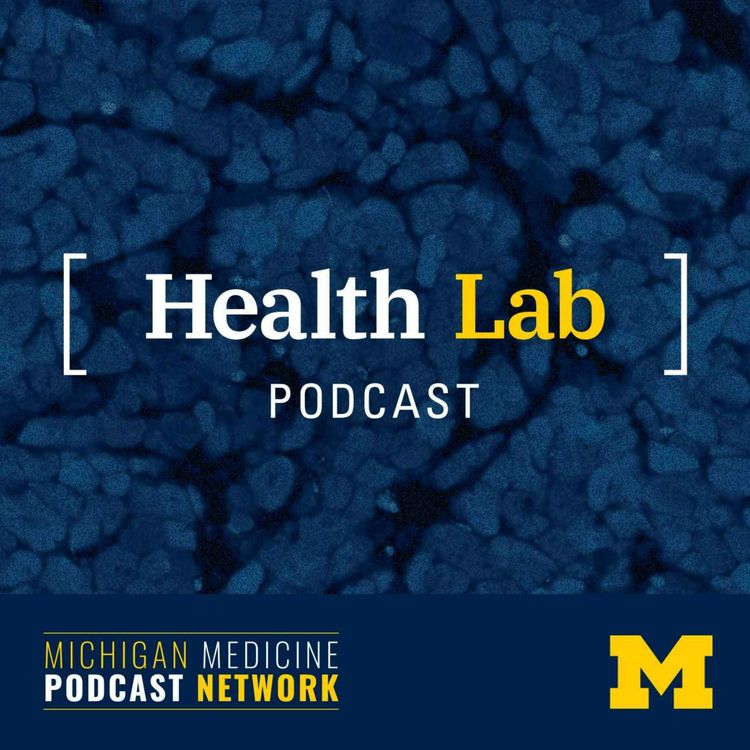
Health Lab
Uterine fibroids: Seeking another option after advice to undergo a hysterectomy
Today on Health Lab, a public health professor publicly shares her personal fibroid journey, addressing racial disparities for Black patients. Visit our website for the full article.
You can find the episode transcript here.
More Info:
For more on this story and for others like it, visit the Health Lab website where you can subscribe to our Health Lab newsletters to receive the latest in health research and information to your inbox each week. Health Lab is a part of the Michigan Medicine Podcast Network, and is produced by the Michigan Medicine Department of Communication. You can subscribe to Health Lab on Apple Podcasts, Spotify, or wherever you listen to podcasts.
All Health Lab content including health news, best practices and research insights are for informational purposes only and are not a substitute for professional or personalized medical guidance. Always seek the advice of a health care provider for questions about your health and treatment options.
More episodes
View all episodes

Re-Release: Growing numbers of diabetic retinopathy in kids
06:16|Research highlights alarming rates of diabetic retinopathy; an ophthalmologist shares what to know. Read the full story on Health Lab. Episode TranscriptAll Health Lab content including health news, best practices and research insights are for informational purposes only and are not a substitute for professional medical guidance. Always seek the advice of a health care provider for questions about your health and treatment options.Health Lab is a part of the Michigan Medicine Podcast Network.
The Trials of Toilet Training
05:00|A recent poll shows that 1 in 5 parents report struggles with toilet training their kids, highlighting many of the challenges and anxieties families face during this major developmental milestone. Read the full story on Health Lab.Episode TranscriptAll Health Lab content including health news, best practices and research insights are for informational purposes only and are not a substitute for professional medical guidance. Always seek the advice of a health care provider for questions about your health and treatment options.Health Lab is a part of the Michigan Medicine Podcast Network.
How to get help during a mental health crisis
15:37|Today on Health Lab, we are sharing resources for what to do in mental health crisis. Read the full story on Health Lab.*Content Warning: Please be aware that this episode has mentions of suicide and self-harm. Episode Transcript Resources988 National Suicide & Crisis Lifeline: Call 988, text any word to 988, or use their webchatVeterans: Press 1 after calling 988, or text any word to 838255 LGBTQ+ youth hotline: Call The Trevor Project at 1-866-488-7386, text the word START to 678678, or use webchatCrisis Text Line: Text HOME to 741741 or visit crisistextline.orgEating disorders: Call the Alliance for Eating Disorders at 1-866-662-1235, or visit their websiteDisaster survivors: Call or text the National Disaster Distress Helpline at 1-800-985-5990, or visit their website. Urgent/Ongoing support: Call 1-800-950-NAMI (6264), text NAMI to 62640 or visit NAMI online988 Safety Plan PDFNAMI Crisis PreparationNAMI Wellness Recovery Action Plan Michigan Crisis Resource DirectoryCCBHC LocatorFindTreatment.govU-M Institute for Firearm Injury PreventionExtreme Risk Protection Order Info & ToolkitAll Health Lab content including health news, best practices and research insights are for informational purposes only and are not a substitute for professional medical guidance. Always seek the advice of a health care provider for questions about your health and treatment options. Health Lab is a part of the Michigan Medicine Podcast Network.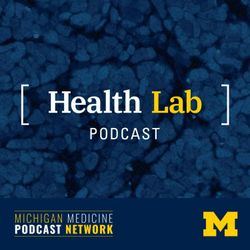
Re-Release: VA research identifies risk factors that could help prevent veteran suicide
07:11|This episode first aired on March 7, 2025.CSREs are conducted after a veteran screens positive for potential suicide risk, as part of the VA's ongoing effort to reduce the number of veterans who die by suicide. In the ongoing effort to reduce the number of veterans who die by suicide, a study identifies key factors that predict whether veterans who received a Comprehensive Suicide Risk Evaluation, the standardized suicide risk assessment implemented nationally in the Veterans Health Administration, will go on to die by their own hands.Additional Resources:Veterans Crisis Line: Accessible by phone by dialing 988 and pressing "1", by text at 838255 and by online chat.U.S. Department of Veterans Affairs Suicide PreventionUniversity of Michigan Institute for Firearm Injury Prevention Extreme Risk Protection Order Information and Implementation ToolkitIf you or someone you know may be considering suicide, or having a mental health or addiction-related crisis, the 988 Lifeline is available for free to anyone, at all times, in both English and Spanish. Call 988 from any phone, text 988 from a mobile device, or visit their live webchat, information on available help, and live help via videophone for people who are Deaf or hard of hearing, or contact the Crisis Text Line by texting TALK to 741741.Episode TranscriptFor more on this story and for others like it, visit the Health Lab website where you can subscribe to our Health Lab newsletters to receive the latest in health research and information to your inbox each week. Health Lab is a part of the Michigan Medicine Podcast Network, and is produced by the Michigan Medicine Department of Communication. You can listen to Health Lab wherever you get your podcasts.All Health Lab content including health news, best practices and research insights are for informational purposes only and are not a substitute for professional medical guidance. Always seek the advice of a health care provider for questions about your health and treatment options.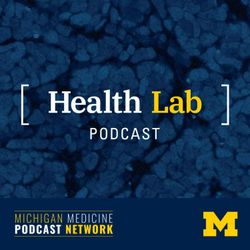
Is it time to let go of "holding it"?
07:09|Did you know that fighting the urge to pee could rewire your brain, and not in a good way? A neuro-urologist and pelvic reconstruction specialist explains. Read the full story on Health Lab.Episode TranscriptLinks for resources mentioned in the episode:Society of Urodynamics Female Pelvic Medicine and Urogenital Reconstruction patient resourcesAmerican Urological Association Urology Care FoundationBladder Training Modules for Urinary Incontinence, created and validated by Janis Miller, Ph.D., from University of MichiganFor more on this story and for others like it, visit the Health Lab website where you can subscribe to our Health Lab newsletters to receive the latest in health research and information to your inbox each week. Health Lab is a part of the Michigan Medicine Podcast Network, and is produced by the Michigan Medicine Department of Communication. You can listen to Health Lab wherever you get your podcasts.All Health Lab content including health news, best practices and research insights are for informational purposes only and are not a substitute for professional medical guidance. Always seek the advice of a health care provider for questions about your health and treatment options.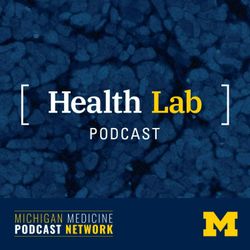
Early Release: Tips for Surviving the Heat
09:39|Extreme heat, especially in places that don't experience it often, can be dangerous - especially to people with certain health conditions. In this episode, Dr. Brad Uren shares tips for weathering extreme heat.You can read the full article on the Health Lab website.Episode TranscriptAdditional Resources:How to protect your baby from the dangers of hot weather5 hot weather tips that could save an older adult’s lifeCDC: Heat and Medications – Guidance for CliniciansVideo: Who's most at risk of heat-related health issues?For more on this story and for others like it, visit the Health Lab website where you can subscribe to our Health Lab newsletters to receive the latest in health research and information to your inbox each week. Health Lab is a part of the Michigan Medicine Podcast Network, and is produced by the Michigan Medicine Department of Communication. You can listen to Health Lab wherever you get your podcasts.All Health Lab content including health news, best practices and research insights are for informational purposes only and are not a substitute for professional medical guidance. Always seek the advice of a health care provider for questions about your health and treatment options.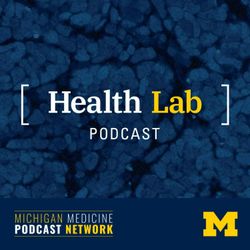
Allergies feeling amplified?
02:48|Today on Health Lab, we highlight how to treat seasonal allergies, and why allergy seasons are getting more severe. You can read the full article on the Health Lab website.Episode TranscriptFor more on this story and for others like it, visit the Health Lab website where you can subscribe to our Health Lab newsletters to receive the latest in health research and information to your inbox each week. Health Lab is a part of the Michigan Medicine Podcast Network, and is produced by the Michigan Medicine Department of Communication. You can listen to Health Lab wherever you get your podcasts.All Health Lab content including health news, best practices and research insights are for informational purposes only and are not a substitute for professional medical guidance. Always seek the advice of a health care provider for questions about your health and treatment options.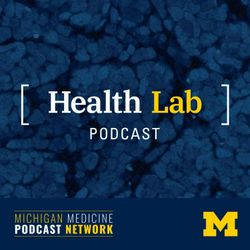
Let's talk about PrEP
05:56|This week on Health Lab, we showcase a recent study that examines the trends in use of pre-exposure prophylaxis, or PrEP, HIV-prevention medication. suggest more effort is needed to boost consistent use. Read the full article on our website.Episode TranscriptFor more on this story and for others like it, visit the Health Lab website where you can subscribe to our Health Lab newsletters to receive the latest in health research and information to your inbox each week. Health Lab is a part of the Michigan Medicine Podcast Network, and is produced by the Michigan Medicine Department of Communication. You can listen to Health Lab wherever you get your podcasts.All Health Lab content including health news, best practices and research insights are for informational purposes only and are not a substitute for professional medical guidance. Always seek the advice of a health care provider for questions about your health and treatment options.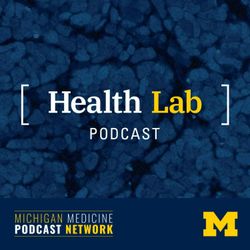
Re-Release: Your health care costs today
13:10|This episode originally aired in March 2025.An expert shares 10 things you should know about your health costs right now. Read the article on Health Lab.Episode TranscriptMedicare & MedigapSwitching Medicare Advantage PlansMedicare Advantage to traditional MedicareSpecial Enrollment PeriodsMedigap Open Enrollment PeriodMedicare Prescription Payment Plan"Extra Help" Medicare ProgramNavigating Medicare: State Health Insurance Assistance ProgramHealthcare.govMarketplace by StateFind out if you can get health coverage nowPreventive Health ServicesUnderstanding HSA-eligible plansUSA.govHow to get help with medical billsFind and contact elected officialsVAEligibility for CarePACT ActCommunity Care Outside the VAArticleA freeze, or a fix? Preventive care coverage at a crossroadsHealth Lab is a part of the Michigan Medicine Podcast Network, and is produced by the Michigan Medicine Department of Communication. All Health Lab content is for informational purposes only and is not a substitute for professional medical guidance. Always seek the advice of a health care provider for questions about your health and treatment options.